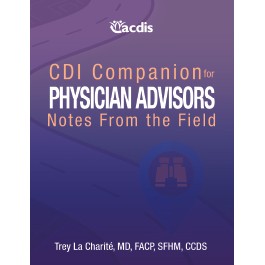Book excerpt: Juggling responsibilities

for Physician Advisors: Notes from the Field
By Trey La Charité, MD, FACP, SFHM, CCDS
Physician advisors do everything from providing pre-/postbill clinical documentation support to assisting with Recovery Auditor (RA) appeals and drafting appeal letters to reviewing charts for medical necessity of inpatient admissions.
Like most other physician advisors, I wear many hats and juggle lots of responsibilities. My official title is medical director for clinical documentation integrity and coding. It’s a trend followed by a good quarter of programs out there, according to ACDIS’ 2016 physician advisor survey and accompanying report. Even more physician advisors also don the cap of advisor for the case management (51%) or utilization review (47%) departments. Others, as do I, also work on claim audits and denials, and a few physician advisors serve as their chief medical officer. (I don’t advise that, however; that’s just too big a hat to effectively wear in tandem with other responsibilities.)
Facilities frequently hire physician advisors to work with case management because there is a clear and consistent financial return on investment associated with matching conditions to their geometric mean length of stay. Facilities still make money based on volume—the “get ‘em in and get ‘em out” mentality. As the pendulum swings to a quality of care payment model, you’ll see more emphasis on core measure and quality reporting and potentially more focus on physician advisor roles in CDI.
One of the most important steps in ensuring a CDI physician advisor’s effectiveness is clearly outlining the expectations of the role. Not all tasks can be or should be “critical” responsibilities. If the physician advisor’s contract allots a mere five hours per week, as seems most common according to the recent ACDIS surveys, those five hours need to be spent on the tasks that will have the greatest positive effect on documentation improvement.
Clearly describing a physician advisor’s expectations within the contractual agreement can help, but the CDI program needs to understand how a physician advisor can best help them, too. For example, if the CDI program focuses principally on CC or MCC capture rate, then how can the physician advisor combat the resulting perception that the CDI program only serves the facility’s financial best interests? While physicians should be concerned with keeping their hospital’s doors open, as I’ve said before and will say again, they place a higher value on understanding how their documentation affects their own performance reports and quality outcomes.
Editor’s note: This excerpt was taken from the CDI Companion for Physician Advisors: Notes from the Field.
